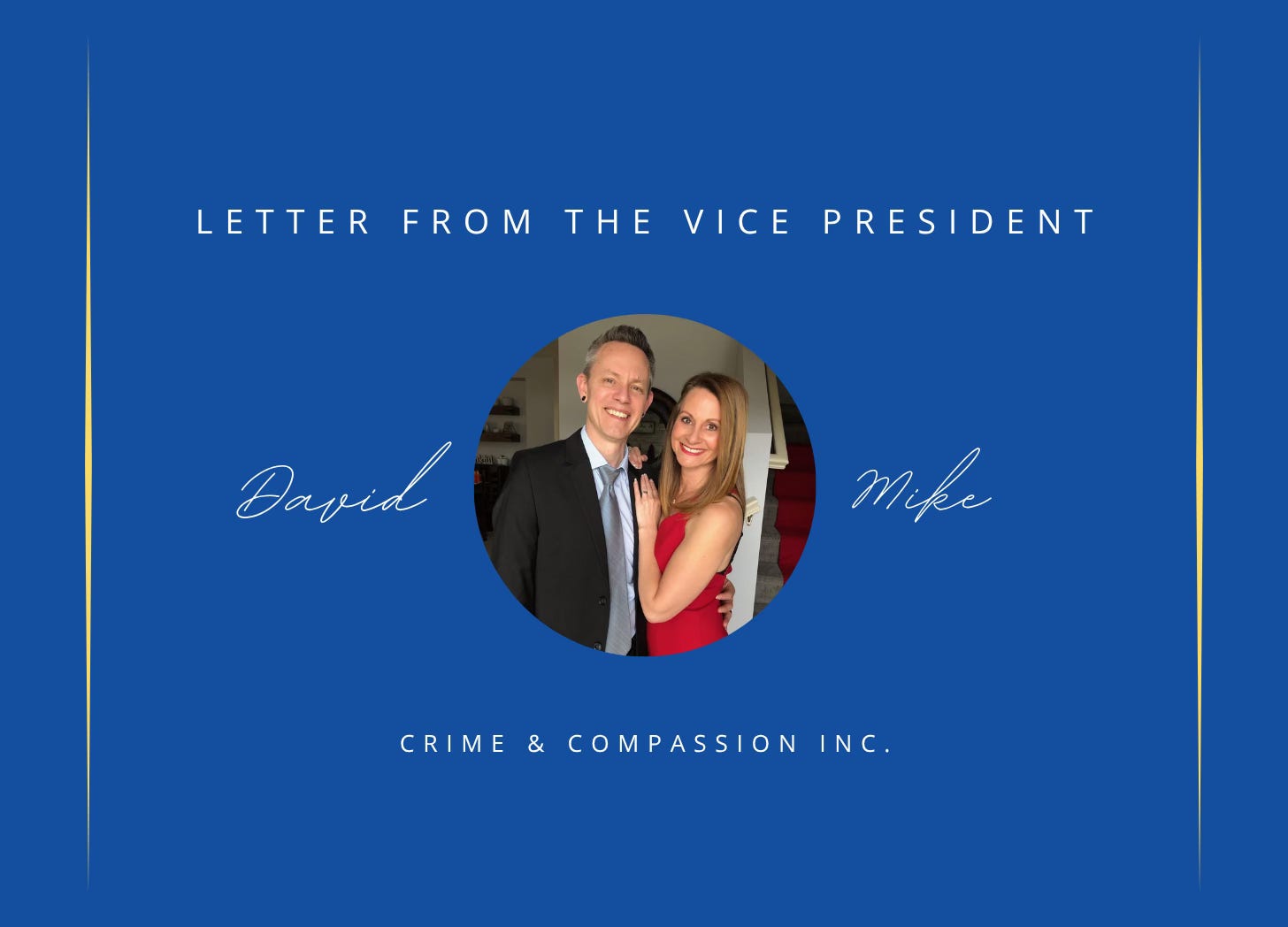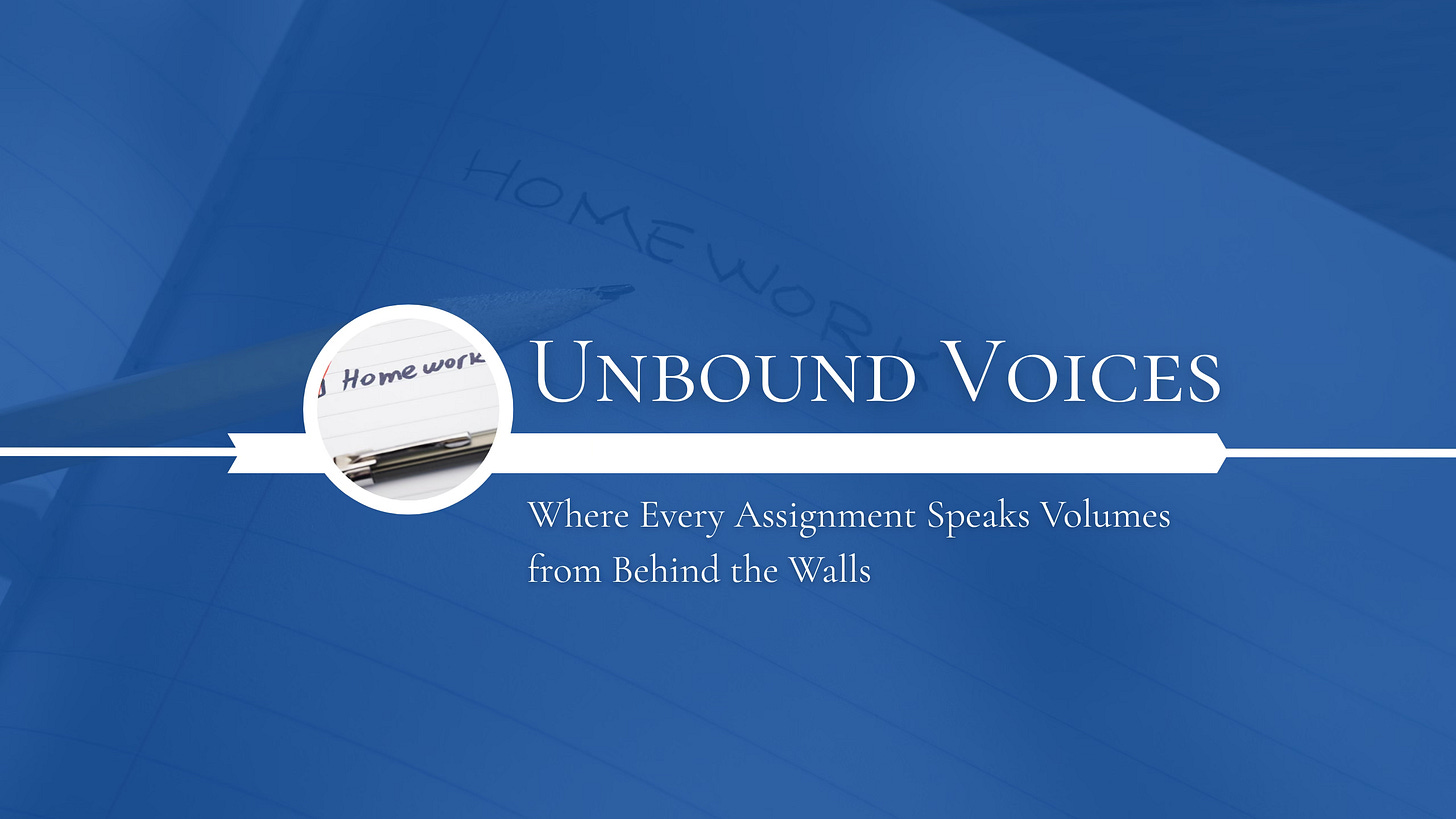A Journey Back to Ft. Leavenworth Military Prison
Issue #8: Author David Mike returns to the Kansas military prison where he was once incarcerated.
Letter from the Vice President
Dear Readers,
David Mike is someone I feel honored to know. His memoir, Dishonor: One Soldier's Journey from Desertion to Redemption, made a big impact on my life. It is a beautiful story of grace and hope.
David was dishonorably discharged from the US Army and found himself incarcerated at the infamous Ft. Leavenworth military prison (United States Disciplinary Barracks). His book takes you along that journey and shows what God did in his life.
When my attorney told me I needed to find people I trust to be on the board of directors, I knew instantly that I would ask David. He humbly accepted the role of vice president on our board, and today he’s going to tell you about his return to Ft. Leavenworth.


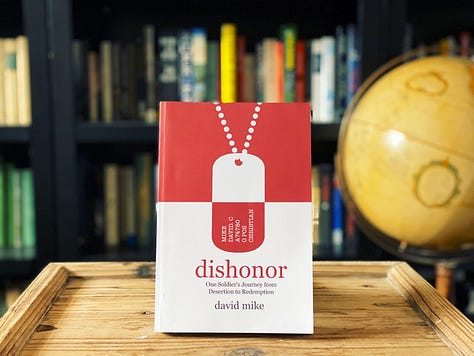
Full Circle: A Journey Back to Ft. Leavenworth
In 1989, I was arrested by the US Army for drugs and desertion. That decision led to a five-year prison sentence and a dishonorable discharge. I served three of those years at the United States Disciplinary Barracks (USDB) in Ft. Leavenworth, Kansas.
It was during that time, inside those walls, that God began to get my attention. He met me in the middle of my brokenness and slowly, steadily, began drawing me back to Himself.
Since then, I have been a cosmetology instructor, which has enabled me to mentor thousands of young people wanting to realize their dream of being a cosmetologist. I have also been blessed to have an amazing wife and five awesome children who enrich my life in so many ways.
Years later, I wrote a book about that chapter of my life: Dishonor: One Soldier’s Journey from Desertion to Redemption. This is where I met Shayla, who graciously edited the book for me. Since its publication, I’ve been sending copies to inmates across the country, hoping to share a message that’s rooted in truth and grace:
We are not defined by our past.
Because of what Jesus did for us, we don’t have to live under the weight of guilt and shame from our lowest moments.
Interrupted Communication
Two years ago, a US Army Chaplain from the USDB reached out to me after reading my memoir. He wanted to collaborate, but before anything could happen, he needed special approval. A policy prohibits USDB staff from engaging with former inmates.
And then . . . silence.
Until February.
After two long years, he reached back out. He’d finally received clearance, and not only could we communicate, but he had also arranged for me to speak at a Transitional Living Course inside the very prison I once called home.
I was invited to meet with program directors and about twenty inmates preparing to graduate from “7 Habits on the Inside,” the adaptation of Stephen Covey’s 7 Habits of Highly Effective People, tailored for correctional environments.
Never in my life did I imagine returning to the USDB, especially not like this. But because this was part of a chapel initiative, I had the freedom to share not only my story but the faith that carried me through it.
We hit a few bumps early on. My initial request for access to the Army post was denied due to my criminal history, but by God’s grace, we found a way around it. We literally just drove through the gate with the guard only checking Chaplain Lime’s military identification card. Prayers answered!
A Surreal Return
Being back at Ft. Leavenworth was unlike anything I’ve ever experienced.
Though the original prison was torn down years ago, many of the structures I once lived and worked in are still standing.
The walls. The towers. The memories.
Chaplain Lime gave me a tour before we headed to the new facility. Later, we returned so I could take some photos. We even had lunch at The 12th Brick, a restaurant now located in the old visitor center, the very place where my family once came to see me. I could still picture the layout. I could still feel the emotions. It was like walking through a living memory.
The new USDB doesn’t have the same ominous feel as the old one. From the outside, it could be mistaken for any military building, until you notice the razor-wire-topped fences surrounding the housing units.
Getting inside was sobering. We passed through TSA-style security and locked gates. When we reached the final iron-barred gate, that old feeling of unease crept back in.
Walking into a prison, no matter your purpose, is never easy.
Chaplain Lime led me to the pastoral care office, where I met several staff members. Inmates attending the ceremony soon began to arrive. One of them, the course facilitator, told me the class was inmate-led. What blew me away was that he is serving a life sentence and still cares to not only grow as an individual but also mentor other inmates to do the same.
The graduation honored inmates completing an advanced version of the course. The next class of students, along with various staff and directors, were also in attendance. Three inmates opened the ceremony by sharing personal testimonies about how the program had challenged them and helped them grow.
Then it was my turn.
Honestly, I was nervous. Those men spoke with such conviction and heart. But I stepped forward, shared my journey, my faith, and my gratitude. Most importantly, I told them how proud of them I was, for investing in themselves, for doing the hard work of change, for believing in the possibility of a better future.
It must have resonated, because the staff told me afterward they’d like to have me back. I was also told I’m only the second former USDB inmate ever invited back in this way. Hearing that was shocking because one would think that bringing in success stories from former USDB inmates would be inspiring.
After the ceremony, I signed copies of my book for the directors and left a copy for each graduate. I even saw two copies sitting on the shelf in the Chapel Library. What an unexpected honor. Chaplain Lime told me that all previous copies of my book were destroyed due to the policy of my having been formerly incarcerated. His work to get my book back inside the walls was the reason they were now there.
Reflection
One of the most meaningful moments came after the event, when I visited the inmate barber shop. I was taken there because I work in the same industry and they wanted to show me how it runs. I met the program director, several inmate barbers, and instructors. One of them has been incarcerated at the USDB since 1989—he arrived just a year before I did. We swapped stories and reminisced about the old facility.
The entire experience was overwhelming in the best way.
Chaplain Lime shared how many things had to align perfectly for this to even happen. The relationships he’d built over the years. The approvals. The persistence. The timing. None of it was accidental.
We both know this was a God thing. Every step, every open door, every delay. It was all part of something bigger.
I’m still processing it all. I’m still humbled.
Never did I think I’d return to Ft. Leavenworth, not as an inmate, but as a messenger of redemption. As a reminder that grace is real, and that God is still in the business of restoring broken things.
I pray this is just the beginning.
David Mike is a Christ follower, husband, father, author, cancer survivor, and cosmetology instructor in Omaha, Nebraska. David is passionate about sharing the message that we do not have to be defined by our past and that God can use our kind of mess for good. He is the author of Dishonor: One Soldier's Journey from Desertion to Redemption.
Follow David Mike on Facebook
Follow David Mike on Instagram
Your Bleeding Heart,
Shayla Hale
Executive Director, Crime & Compassion Inc.
Oklahoma Will Not Seek Death Penalty in New Trial against Richard Glossip — Attorney General Gentner Drummond said his office will not seek the death penalty, but he does not plan to dismiss the existing first-degree murder charges filed against Glossip. "While it was clear to me and to the U.S. Supreme Court that Mr. Glossip did not receive a fair trial, I have never proclaimed his innocence," Drummond said. "After the high court remanded the matter back to district court, my office thoroughly reviewed the merits of the case against Richard Glossip and concluded that sufficient evidence exists to secure a murder conviction. The same United States Constitution that guarantees our rights also ensures the rights of the accused. Unlike past prosecutors who allowed a key witness to lie on the stand, my office will make sure Mr. Glossip receives a fair trial based on hard facts, solid evidence and truthful testimony." Although the ruling removed Glossip from death row, he has remained in custody and was booked into the Oklahoma County Detention Center in April.
Oklahoma Executes Death Row Inmate John Fitzgerald Hanson — John Fitzgerald Hanson (age 61) received a three-drug lethal injection at the Oklahoma State Penitentiary in McAlester on June 12. He was pronounced dead at 10:11 a.m. Hanson was sentenced to die after he was convicted of carjacking, kidnapping, and killing a Tulsa woman in 1999. “Peace to everyone,” Hanson said while strapped to a gurney inside the prison’s death chamber.
Appeals Court Hearts Oral Arguments for Death Row Inmate Brenda Andrew — On June 18, the 10th Circuit Court of Appeals convened in a pivotal hearing for Brenda Andrew, the only female on Oklahoma death row. After the US Supreme Court’s historic ruling in January, Andrew has the opportunity for a retrial. Nathalie Greenfield (one of Andrew’s lawyers) delivered a powerful argument, wherein she discussed the gratuitous gender stereotyping and sex-shaming in the original trial—from holding up Andrew’s thong in court, to calling her a “slut puppy” and “hoochie” before the jury. During the Oral Arguments, one judge referred to the first trial as “atrocious.” With arguments concluded, the court is now deliberating and we await its ruling.
Writers Guild Advanced Homework: Holding My Novel for the First Time
The students in Writers Guild Advanced were asked to do a homework assignment: Write what you believe it will feel like to hold your novel in your hands for the first time. They were to implement what they’ve learned with colors, sounds, setting, and more, but ultimately, to focus on what that moment will feel like for them. With their permission, here are a few beautifully written answers to that question:
“My novel will smell like a freshly published piece of art to me.
It will smell like success and closure.
It will smell like the evidence of a new path for my future.”
—P. M.
“The book smells good, it smells new, it smells like pages come to life. It smells like a dream.
It smells like hope, ambition. It smells like happiness, the happiness of reading a new story.
The hope of the future, the whimsy of the past. It smells like paper and ink.
It smells like excitement. Like my sweat and tears, my thoughts.
The smell of this paper and ink is my thoughts.”
—M. B.
“Tears rolled silently down my face as I held my book in my hands.
Seeing my maiden name on the cover of a published novel overwhelmed my soul with the pride and satisfaction of accomplishment. My grandparents would be so proud, and may even have felt honored to share the last name of an actual author.
I did it. I really did it. It felt amazing to have accomplished such a great feat. Closing my eyes, I examined my book with the eyes of my heart. The textured matte cover and embossed lettering reminded me of snuggling up with a fuzzy throw, holding a hot cup of cocoa, in front of the fireplace, inside of a log cabin during an evening blizzard.
Pure comfort, the secure promise of safety and the liberty of endless amounts of time.”
—S. G.
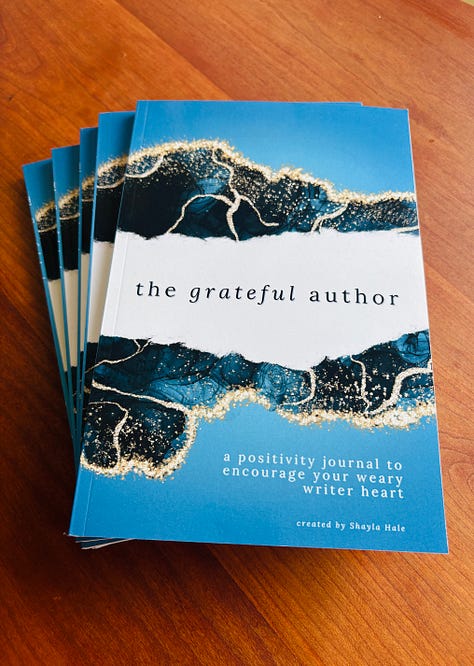
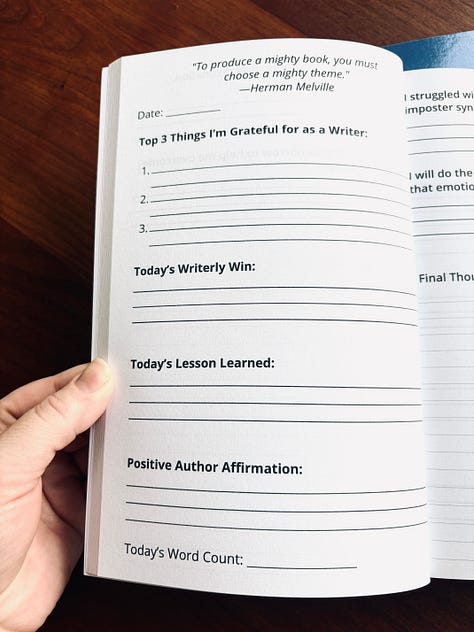
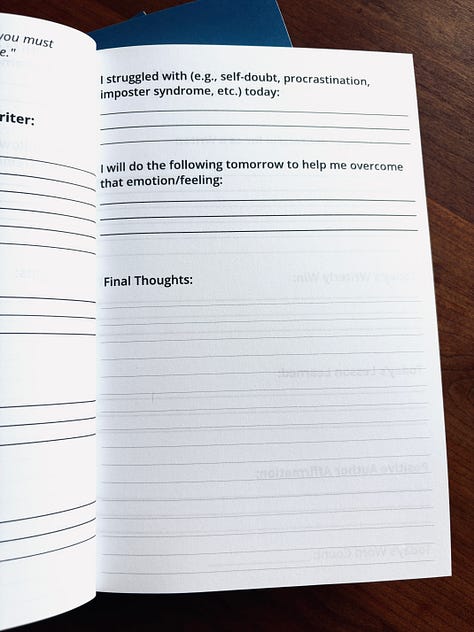
A Gratitude Journal for Our Incarcerated Students
Originally created for our incarcerated students, The Grateful Author is a 60-day journal to help our class when they struggle with imposter syndrome, writer’s block, and self-doubt.
Now any writer can use it!
Each page begins with an encouraging quote, then an area to write your top three moments of gratefulness. After you’ve taken time to be thankful, you can jot down your writerly wins, lessons learned, positive author affirmations, and that day’s word count. There’s also a section where you can be vulnerable and reflect on your attitude and mental health. Finally, you can finish up your daily thoughts in the journal section.
Taking time to be grateful creates a foundation of positivity in your life as an aspiring author. Use this journal to express your gratitude, fight writer’s block, and stomp out self-doubt.
***100% of book sales goes right back into our nonprofit to support our mission!***
5 Quick Things
I’m reading . . . Gerald’s Game by Stephen King. Still. Got behind on my reading, but I’m prioritizing it again.
I’m writing . . . . 5 things I’m grateful for every morning. If I take time to jot down a few things I’m grateful for, it really does make a difference in my attitude!
I’m learning . . . How to delegate! I’ve never been . . . great . . . at asking for help, but running a nonprofit squishes that pretty quickly! I’ve been learning to lean more on the board, my volunteers, family, friends. Most everyone wants to help—you just gotta ask.
I’m teaching . . . How to write about food! In Writers Guild Advanced, we recently went over Lesson 19 — Breaking Bread: Using Food to Strengthen Setting, Culture & Character Relationships. The students have homework to turn in this Sunday, where they get to write a scene with food.
I’m excited about . . . Two classes in the books for Writers Guild Beginners! Our second class started on June 1, and we have such energetic, excited students. They’re ahead of the game with their homework and taking on this 6-month project like nobody’s business. Already so proud of them!
After a 14-year career in publishing, Shayla Hale said goodbye to her authors so she could advocate for the incarcerated. Now a bleeding heart, she teaches writing classes at Mabel Bassett Correctional Center in McLoud. She also enjoyed two years as a volunteer chaplain at Oklahoma County Jail.
Shayla is the founder and executive director of Crime & Compassion Inc.,
a nonprofit that gives incarcerated individuals the tools to become authors, empowering those in and out of prison to cultivate meaningful work opportunities.
Her classes on the inside encourage creativity and confidence, and her podcast and newsletter shine a bright light on incarceration. Her heart’s desires are to unconditionally love the incarcerated, to help them bring their books into the world, and to fight with and for those affected by the US justice system.





